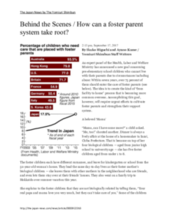Displaying 211 - 220 of 323
This article, from Korea Exposé, shines light on the many difficulties and obstacles that South Korean adoptees face in trying to identify and locate their birth families.
This study evaluated the feasibility, acceptance, preliminary outcomes and potential sustainability of a community-based intervention program for left behind children in China.
17.5% of children who need care in Japan live in foster placements, while most of them are living in institutions; an expert panel of the Health, Labor and Welfare Ministry, however, has announced a new goal which prioritizes foster care.
New research explores the traumatic experiences of children adopted from South Korean orphanages by American families following the end of the Korean War.
Japan's Health, Labor and Welfare Ministry has announced new targets for children in need of alternative care.
This book reviews changes in policy and practices that affected the generation of young people who grew up in state care in China in the last 20 years.
"Boot camps" for youth with internet and gaming addictions have become increasingly popular in China and are criticized for their military-style discipline and harsh practices. The recent death of a Chinese teenager just two days after entering one such instution has sparked an outrage over the use of these institutions and their practices.
This chapter of Child Maltreatment in Residential Care describes the progression of changes in China's child care and protection policies to reduce the use of institutional care for children and increase efforts toward family strengthening and family-based models of alternative care.
Since South Korea's adoption of a law banning adoption agencies from accepting undocumented babies, the number of infants abandoned in the country have increased.
The recent death of a deported Korean adoptee ignites adoptee-led organizations to call on the Korean government to end the "industrialized international adoption" system in South Korea.


